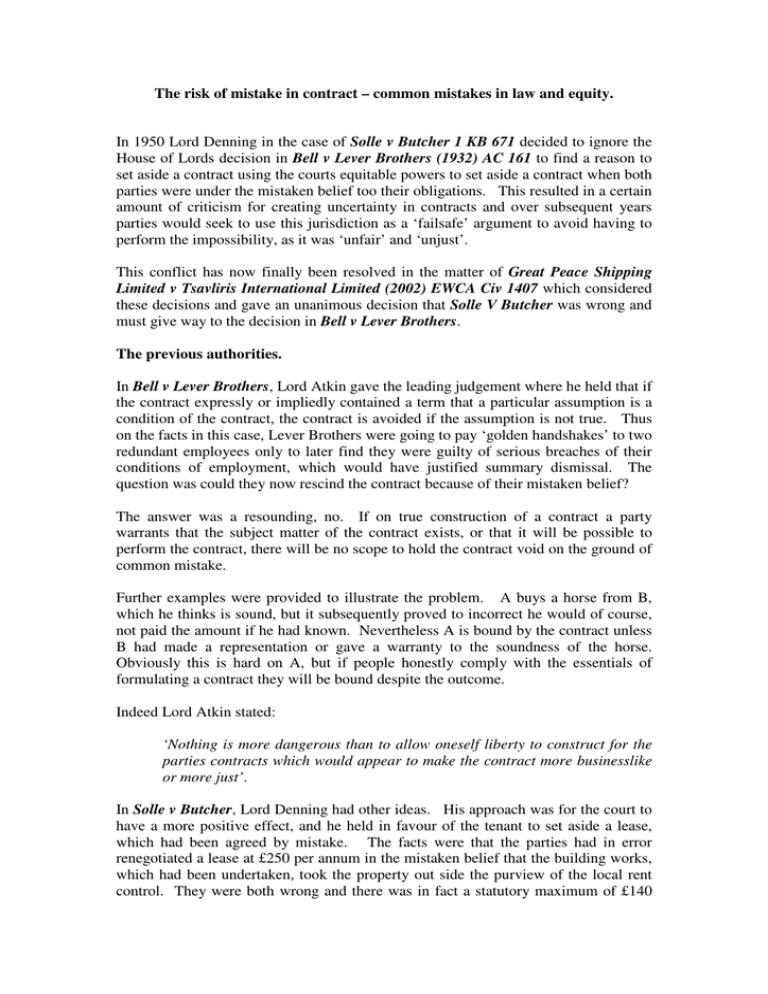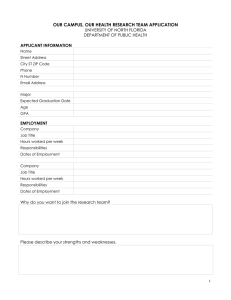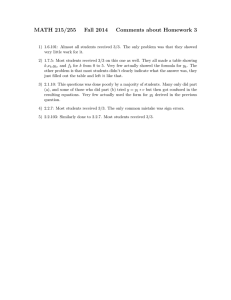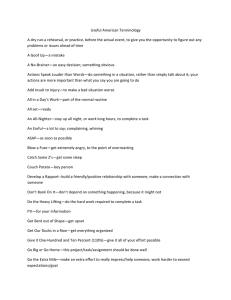The risk of mistake in contract – common mistakes in law
advertisement

The risk of mistake in contract – common mistakes in law and equity. In 1950 Lord Denning in the case of Solle v Butcher 1 KB 671 decided to ignore the House of Lords decision in Bell v Lever Brothers (1932) AC 161 to find a reason to set aside a contract using the courts equitable powers to set aside a contract when both parties were under the mistaken belief too their obligations. This resulted in a certain amount of criticism for creating uncertainty in contracts and over subsequent years parties would seek to use this jurisdiction as a ‘failsafe’ argument to avoid having to perform the impossibility, as it was ‘unfair’ and ‘unjust’. This conflict has now finally been resolved in the matter of Great Peace Shipping Limited v Tsavliris International Limited (2002) EWCA Civ 1407 which considered these decisions and gave an unanimous decision that Solle V Butcher was wrong and must give way to the decision in Bell v Lever Brothers. The previous authorities. In Bell v Lever Brothers, Lord Atkin gave the leading judgement where he held that if the contract expressly or impliedly contained a term that a particular assumption is a condition of the contract, the contract is avoided if the assumption is not true. Thus on the facts in this case, Lever Brothers were going to pay ‘golden handshakes’ to two redundant employees only to later find they were guilty of serious breaches of their conditions of employment, which would have justified summary dismissal. The question was could they now rescind the contract because of their mistaken belief? The answer was a resounding, no. If on true construction of a contract a party warrants that the subject matter of the contract exists, or that it will be possible to perform the contract, there will be no scope to hold the contract void on the ground of common mistake. Further examples were provided to illustrate the problem. A buys a horse from B, which he thinks is sound, but it subsequently proved to incorrect he would of course, not paid the amount if he had known. Nevertheless A is bound by the contract unless B had made a representation or gave a warranty to the soundness of the horse. Obviously this is hard on A, but if people honestly comply with the essentials of formulating a contract they will be bound despite the outcome. Indeed Lord Atkin stated: ‘Nothing is more dangerous than to allow oneself liberty to construct for the parties contracts which would appear to make the contract more businesslike or more just’. In Solle v Butcher, Lord Denning had other ideas. His approach was for the court to have a more positive effect, and he held in favour of the tenant to set aside a lease, which had been agreed by mistake. The facts were that the parties had in error renegotiated a lease at £250 per annum in the mistaken belief that the building works, which had been undertaken, took the property out side the purview of the local rent control. They were both wrong and there was in fact a statutory maximum of £140 per annum and the tenant sought a declaration to that effect and the return of the ‘over paid’ rent. Great Peace and the Cape Providence Lord Denning’s approach will now be consigned to history with the decision in Great Peace. The facts of this case involved a ship called ‘Cape Providence’ which was sailing from Brazil to China, when in the South China Sea it encountered difficulties, which resulted in the possibility that it may not finish its journey. The owners naturally sought assistance and located a tug, but this was unable to reach the stricken ship for a further 5 to 6 days. This may have been too late and so, as a stop gap they were informed of a nearer ship called ‘Great Peace’, which could have been there in 12 hours to provide the assistance in getting the crew off in the event of a catastrophe. It transpired that the Great Peace was actually more than 38 hours from a possible rendezvous and the owners of the Cape Providence claimed that the contract was therefore void ab initio for mistake, or that it should be rescinded in equity. It was held where there was a common or mutual mistake it would raise difficult and important issues of construction and where it was possible to perform the contract but it was alleged that a mistake in relation to a fundamental assumption, which rendered performance of the obligation impossible (or on these facts impracticable) it will be necessary to determine this. The following elements must be present if common mistake is to void a contract: 1. There must be a common assumption as to the existence of a state of affairs. 2. There must be no warranty by either party that that state of affairs exists. 3. The non-existence of the state affairs must not be attributable to the fault of either party. 4. The non-existence of the state of affairs must render performance of the contract impossible. 5. The state of affairs may be the existence, or vital attribute, of the consideration to be provided or circumstances which must subsist if performance of the contractual adventure is to be impossible. The court will need to run through these steps, and if there are unforeseen circumstances, which make the performance impossible it will be necessary for one party to have undertaken the responsibility of this state of affairs. It was held that the present contract would not be void or rescinded as it was the agents acting for Cape Providence who obtained the position of the stricken ship and they had therefore assumed the risk that this information may prove to be incorrect. The risk that performance might prove impossible or impracticable was irrelevant and the contract would be enforceable. Summary It begs the question who should bear the risk in a construction contract when a party is under a mistaken belief? The answer is likely that the party will have little scope in pulling out on the grounds of their mistake. The court argued that most contracts often expressly or by implication provided where the risks should fall and as a consequence particularly in construction contracts care should be taken to review and appreciate where these risks are. The lesson from this case is that unless the common or mutual mistake renders the essence of the contract fundamentally different from what the parties anticipated, which will be unlikely, they will be required to complete their obligations impossible or not. Author: Date: Email: Web: Graham Read 21st April 2003 graham.read@alway-associates.co.uk www.alway-associates.co.uk






